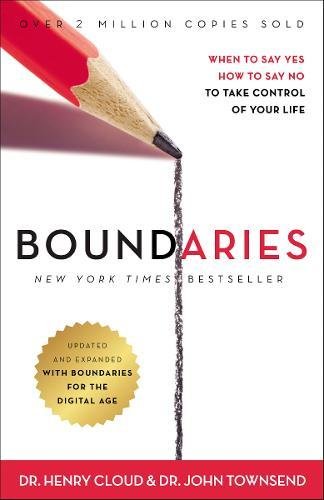Healthy Boundaries
For many Believers, saying “no” does not seem Christian. After all Christ said, “Give to him that asketh thee, and from him that would borrow of thee turn not thou away.” (Matt 5:42) However, many Christians have misapplied this verse and have found themselves enabling dependence, abusing others’ kindness, taking responsibilities they cannot fulfill, and becoming bitter in ministry.
The law of love is a larger understanding that cradles Christ’s important instruction – true love is voluntary. That is, we love best when we love out of our boundaries. Consider Jesus: his expression of love on the cross was made real because he gave of himself. He was not coerced. “No man taketh it from me, but I lay it down of myself. I have power to lay it down, and I have power to take it again.” (John 10:18) When we can say “no,” but we voluntarily say “yes” because we want to say “yes,” we exhibit love in the truest sense.
God created us with boundaries. Our physical bodies separate what is, and is not, us. This is a boundary. In like manner, it is important to have a proper understanding of our emotional, spiritual and mental boundaries. It is incumbent upon us to be good stewards of our boundaries. We do not love well with rigid boundaries. Boundaries which are impenetrable shut others out and therefore, make loving others difficult. We shut out the bad, but also shut out the good. Also, we do not love well with loose or lax boundaries. Boundaries which are easily penetrable allow others to take advantage of us. We are continually taken from and not given the opportunity to voluntarily give. We can become “menpleasers” (Col. 3:22) as we begin to find our value in what we offer someone else instead of finding our value in the completeness found in Christ (Col. 2:10).
The first step in establishing healthy boundaries is to KNOW YOURSELF. Boundaries get confused when our view of ourselves is subject to the ebb and flow of my or others’ opinions. We need to be settled in the complete view God has toward us in order to be able to maintain healthy boundaries.
The second step in living out healthy boundaries is to take RESPONSIBILITY “for” yourself and “to” others. Reap what you personally sow. Consequences will be a very good teacher. Reaping the consequence of another person’s planting is not being responsible “to” them. Yes, Christ’s law of love compels us to help others; however, boundaries ensure this care for others is wise and effective.
The third step towards healthy boundaries is having RESPECT. Just as property boundaries need to be respected, we need to respect our own personal boundary limits and those of others. Realizing what we can and cannot control is valuable. Focus on what we each have the ability to control. When we respect others’ boundaries we receive “no” from them much easier.
The fourth step for healthy boundaries is using DISCERNMENT. Proper discernment helps us say “no.” We understand the difference between disappointing versus harming another person. We see that our decisions will affect others, but we cannot own or be responsible for their reactions. Our “no” may very well disappoint or even make others angry at times, but it should not harm another.
Lastly being PROACTIVE is important for healthy boundaries. A proactive person is not lazy. They do not think they are a “victim.” Every time we say “yes” to something, we say “no” to something else. Be proactive in what we say “no” to. Every “no” allows us another opportunity for a “yes.” It is in this “yes” that we love and love in the true sense – voluntarily.
To view complete PDF, click here.
For Further Information:
Boundaries Podcast Series ![]()
In this podcast series, Arlan Miller and Matt Kaufmann walk through five principles for living with healthy boundaries.
Boundaries Webinar
In this webinar, we talk through practical ways to address the discouragement that can come with mentoring relationships. [ACCFS]
Boundaries Books.com
This website contains articles, videos, and resources on the topic of boundaries.
 Boundaries: When to Say Yes, When to Say No, To Take Control of Your Life
Boundaries: When to Say Yes, When to Say No, To Take Control of Your Life ![]()
Authors: Dr. Henry Cloud & Dr. John Townsend
This 304-page book is about developing emotional and relational boundaries. It focuses on helping you take responsibility for your own actions and not let others run over your boundaries by using guilt, anger, or manipulation.
 Boundaries in Marriage
Boundaries in Marriage ![]()
Author: Dr. Henry Cloud
This 253-page book addresses how spouses can build a healthy relationship. This book is especially helpful for individuals who have a spouse who isn’t interested in working on the relationship.
 Boundaries with Kids
Boundaries with Kids ![]()
Author: Dr. Henry Cloud
This 223-page book helps parents learn to set healthy limits with children. The goal is to help children learn to take responsibility for their actions, to be respectful of others, and to develop Christ-like character traits.





Comments
Leave a Comment